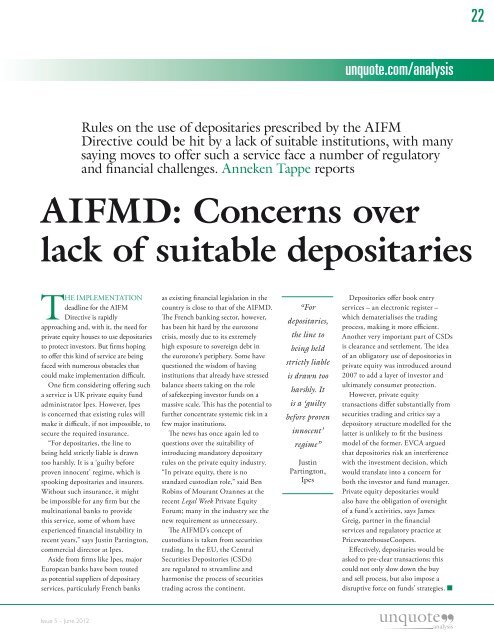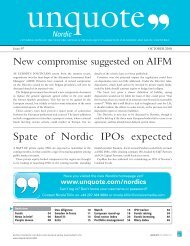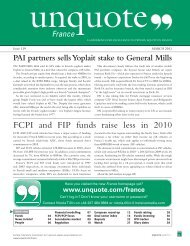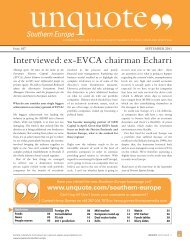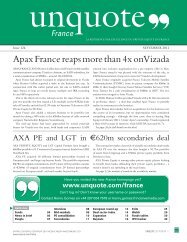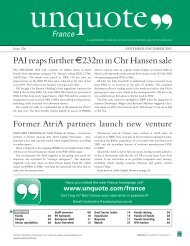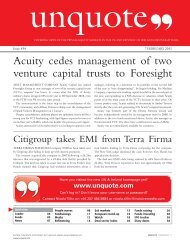Firstly, Lion Capital acquired eyewear retailer Alain Afflelou - Unquote
Firstly, Lion Capital acquired eyewear retailer Alain Afflelou - Unquote
Firstly, Lion Capital acquired eyewear retailer Alain Afflelou - Unquote
You also want an ePaper? Increase the reach of your titles
YUMPU automatically turns print PDFs into web optimized ePapers that Google loves.
22<br />
unquote.com/analysis<br />
Rules on the use of depositaries prescribed by the AIFM<br />
Directive could be hit by a lack of suitable institutions, with many<br />
saying moves to offer such a service face a number of regulatory<br />
and financial challenges. Anneken Tappe reports<br />
AIFMD: Concerns over<br />
lack of suitable depositaries<br />
The implementation<br />
deadline for the AIFM<br />
Directive is rapidly<br />
approaching and, with it, the need for<br />
private equity houses to use depositaries<br />
to protect investors. But firms hoping<br />
to offer this kind of service are being<br />
faced with numerous obstacles that<br />
could make implementation difficult.<br />
One firm considering offering such<br />
a service is UK private equity fund<br />
administrator Ipes. However, Ipes<br />
is concerned that existing rules will<br />
make it difficult, if not impossible, to<br />
secure the required insurance.<br />
“For depositaries, the line to<br />
being held strictly liable is drawn<br />
too harshly. It is a ‘guilty before<br />
proven innocent’ regime, which is<br />
spooking depositaries and insurers.<br />
Without such insurance, it might<br />
be impossible for any firm but the<br />
multinational banks to provide<br />
this service, some of whom have<br />
experienced financial instability in<br />
recent years,” says Justin Partington,<br />
commercial director at Ipes.<br />
Aside from firms like Ipes, major<br />
European banks have been touted<br />
as potential suppliers of depositary<br />
services, particularly French banks<br />
as existing financial legislation in the<br />
country is close to that of the AIFMD.<br />
The French banking sector, however,<br />
has been hit hard by the eurozone<br />
crisis, mostly due to its extremely<br />
high exposure to sovereign debt in<br />
the eurozone’s periphery. Some have<br />
questioned the wisdom of having<br />
institutions that already have stressed<br />
balance sheets taking on the role<br />
of safekeeping investor funds on a<br />
massive scale. This has the potential to<br />
further concentrate systemic risk in a<br />
few major institutions.<br />
The news has once again led to<br />
questions over the suitability of<br />
introducing mandatory depositary<br />
rules on the private equity industry.<br />
“In private equity, there is no<br />
standard custodian role,” said Ben<br />
Robins of Mourant Ozannes at the<br />
recent Legal Week Private Equity<br />
Forum; many in the industry see the<br />
new requirement as unnecessary.<br />
The AIFMD’s concept of<br />
custodians is taken from securities<br />
trading. In the EU, the Central<br />
Securities Depositories (CSDs)<br />
are regulated to streamline and<br />
harmonise the process of securities<br />
trading across the continent.<br />
“For<br />
depositaries,<br />
the line to<br />
being held<br />
strictly liable<br />
is drawn too<br />
harshly. It<br />
is a ‘guilty<br />
before proven<br />
innocent’<br />
regime”<br />
Justin<br />
Partington,<br />
Ipes<br />
Depositories offer book entry<br />
services – an electronic register –<br />
which dematerialises the trading<br />
process, making it more efficient.<br />
Another very important part of CSDs<br />
is clearance and settlement. The idea<br />
of an obligatory use of depositories in<br />
private equity was introduced around<br />
2007 to add a layer of investor and<br />
ultimately consumer protection.<br />
However, private equity<br />
transactions differ substantially from<br />
securities trading and critics say a<br />
depository structure modelled for the<br />
latter is unlikely to fit the business<br />
model of the former. EVCA argued<br />
that depositories risk an interference<br />
with the investment decision, which<br />
would translate into a concern for<br />
both the investor and fund manager.<br />
Private equity depositaries would<br />
also have the obligation of oversight<br />
of a fund’s activities, says James<br />
Greig, partner in the financial<br />
services and regulatory practice at<br />
PricewaterhouseCoopers.<br />
Effectively, depositaries would be<br />
asked to pre-clear transactions; this<br />
could not only slow down the buy<br />
and sell process, but also impose a<br />
disruptive force on funds’ strategies. n<br />
Issue 5 – June 2012


